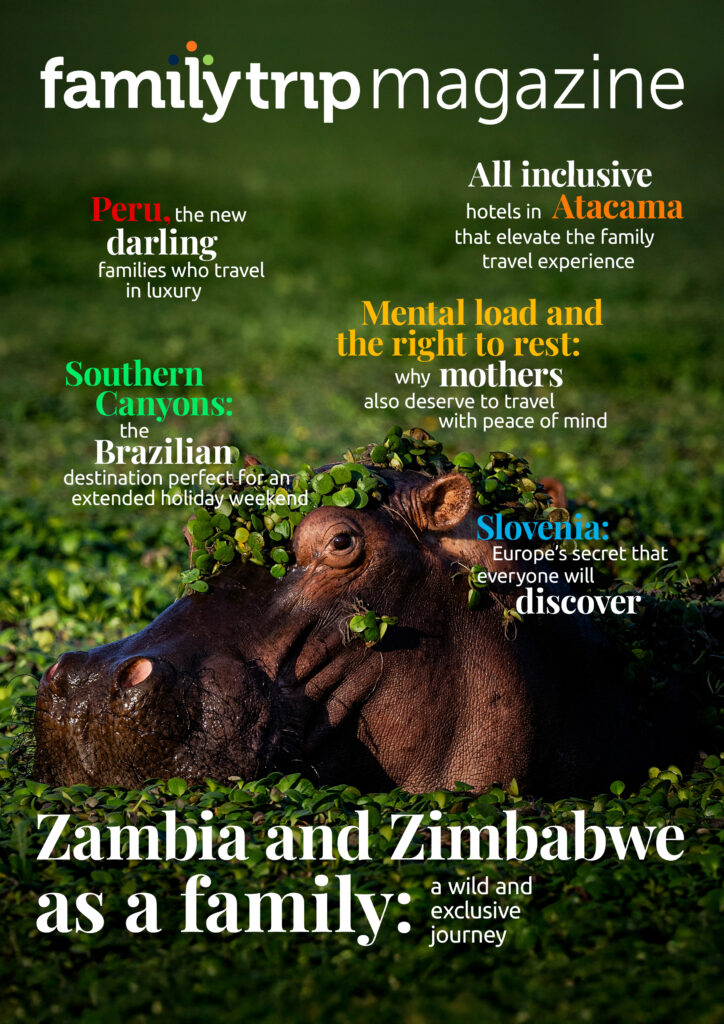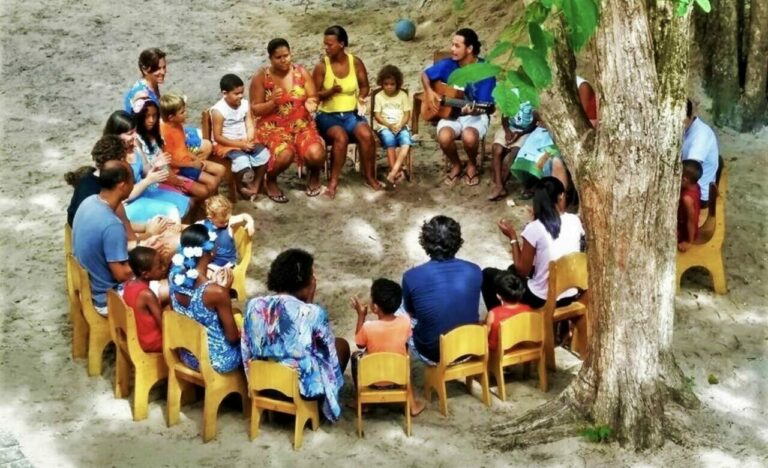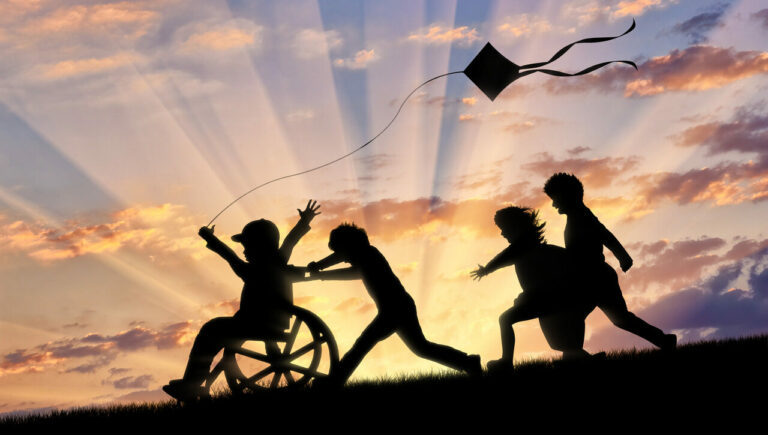
- Lessons from the road
Learning through family travel: investing in the future
Traveling as a family to different destinations is a journey of discovery, where each step leads to a deeper and more meaningful understanding of the world and ourselves
By Natália Faria G. Viana
In an era when education surpasses school boundaries, it’s imperative to consider the value of travel as an essential complement to formal learning. It’s not just about visiting historical sites, natural parks, and museums; family travel allows creating a holistic approach to children’s and teenagers’ education. Breaking routine and contacting multiple scenarios and cultural differences provide unparalleled personal growth for those still in formation, allowing them to explore the world beyond classroom limits in an intimate and personal way.
Especially for those of school age, traveling is always an experience that allows contact with history, culture, and nature in a stimulating way. It’s when one can experience firsthand abstract concepts taught by teachers at the blackboard, such as history, geography, sociology, and natural sciences. Lessons learned during travel extrapolate textbook pages; they become lasting memories and foundations for global education. From immersion in different cultures to appreciation of the world’s natural diversity, each travel experience offers a unique and enriching learning opportunity.
In this context, one of the main differences between school trips and family travel lies precisely in parents’ or guardians’ presence and involvement. Being in the company of the primary family nucleus during travel generates a series of particularities that contribute significantly to learning, such as being outside daily dynamics while maintaining a welcoming environment. Especially for little ones, this proximity transmits a sense of security and comfort, allowing them to explore unknown scenarios with greater confidence, which tends to stimulate curiosity and involvement even more. Parental figures play the role of guides and mentors during travel, providing guidance and support whenever necessary. This creates a propitious atmosphere for learning, where children feel more encouraged to ask questions, try new activities, and expand their horizons.
What can be learned on a family trip?
Learning that transcends books
With some planning and preparation, parents or guardians can use family travel as an educational tool that complements formal learning. This approach transforms travel into an immersive experience that transcends textbooks, giving children and teenagers the chance to absorb knowledge vividly and engagingly.
By exploring historical sites like medieval castles or archaeological sites, we not only witness but also contact history in a realistic and palpable way, diving into scenarios that previously existed only in theory. In these different contexts, children are transported beyond important facts and dates. Walking through an ancient city’s streets or seeing a museum’s rich collection up close gives them a tangible perspective on periods and cultures that may seem distant in the classroom. These immersions awaken not only children and teenagers’ interest but also their imagination and curiosity, encouraging them to ask questions and deepen their understanding of the world around them.
Family travel also favors interdisciplinary learning. When visiting a national park, for example, children and teenagers not only learn about biodiversity and local ecosystems but also about geography, geology, and environmental conservation. They can observe up close the interaction between different plant and animal species, explore impressive geological formations, and learn about efforts to protect and preserve each of these precious habitats.
In summary, family travel yields incomparable educational baggage, enriching children and teenagers’ academic knowledge and stimulating their critical thinking, creativity, and empathy. By experiencing history, culture, and nature authentically and meaningfully, young people become more conscious and engaged global citizens, prepared to face modern world challenges with confidence and understanding.
Teaching practical skills for daily life
Family travel allows exploring new places and generates a propitious environment for teaching practical and important skills for daily life. During a well-planned trip, parents or guardians can involve children in various activities that promote essential skill development.
Starting with itinerary planning, which is an activity that can involve the whole family, allowing little ones to learn early to read maps, use navigation apps, and understand basic concepts of geography and direction. This not only strengthens spatial orientation skills during development but also teaches making informed decisions and working as a team to achieve a common goal.
The trip’s financial planning is another great occasion where kids can learn about money management and responsible decision-making. By helping calculate expenses, compare prices, and make conscious choices about how to direct the family budget, young travelers develop math skills, critical thinking, and financial responsibility.
Facing unexpected challenges during travel is also an effective way to promote important skill development, such as problem-solving and critical thinking. Flight delays, communication problems in a foreign country, or unforeseen issues during planned activities may require older children to act quickly and effectively in trying to collaborate in seeking solutions. Such setbacks not only strengthen the ability to deal with adverse situations but also teach maintaining calm, confidence, and adaptability when facing unforeseen circumstances. By involving children in planning activities, teaching financial management principles, and facing challenges together, their guardians are preparing them to become responsible, resilient, and confident adults.

Personal growth and understanding the world around us
“A man needs to travel. On his own, not through stories, images, books, or TV. He needs to travel by himself, with his own eyes and feet, to understand what is his. To one day plant his own trees and value them. Know cold to enjoy warmth. And the opposite. Feel distance and helplessness to be well under his own roof. A man needs to travel to places he doesn’t know to break this arrogance that makes us see the world as we imagine it, and not simply as it is or can be. That makes us teachers and doctors of what we haven’t seen, when we should be students, and simply go see.” – Amyr Klink.
This famous quote from Amyr Klink, renowned Brazilian navigator, speaker, and author – besides being father of three girls who followed his traveling footsteps – resonates with a profound message about the importance and intrinsic benefits of traveling. He argues that travel is not just a superficial or recreational experience, but rather an essential necessity for personal growth and understanding the world around us. The author of “One hundred days between sky and sea” and “Endless sea” emphasizes the importance of traveling on one’s own, not just consuming stories, images, or others’ accounts, but experiencing the world directly through one’s own eyes and feet. He suggests this direct experience is fundamental to truly understand and appreciate the world and its diverse facets.
The metaphor of “planting your own trees and valuing them” conveys the powerful idea of cultivating our experiences and giving them personal meaning. This implies that by traveling and contacting new cultures, landscapes, and scenarios, we’re enriching our own inner world and developing a deeper appreciation for what is truly significant in our lives. The navigator, who pioneered crossing the South Atlantic by rowing in 1984, also highlights the importance of experiencing extremes – knowing cold to appreciate warmth and vice versa. This idea emphasizes the importance of exposing oneself to various situations to gain a more complete and balanced life understanding. He argues that only by facing certain challenges and discomforts can we truly value the privileges in our lives.
Klink also addresses the issue of human arrogance, which leads us to see the world only as we imagine it, instead of as it really is. In his view, traveling to unknown places can break this arrogance, making us more humble and open to learning from others’ perspectives. All this reinforces the importance of traveling as a journey of self-discovery and personal growth. By venturing beyond our comfort zones and familiarity, we can expand our horizons, cultivate deeper world understanding, and ultimately become more humble students of life.
Amyr Klink’s reflections on the importance of traveling also apply significantly to family travel. By embarking on adventures together, parents and children go beyond just exploring new places, cultivating deeper connections with each other and the world around them. Family travel provides a propitious environment for personal growth and mutual understanding, as all members share experiences, challenges, and discoveries. Furthermore, by witnessing together cultural diversity and world richness, families have the chance to build lasting memories and strengthen family bonds, promoting a sense of unity and belonging that endures beyond geographical borders. Thus, family travel is not just an opportunity to explore the world, but also a shared journey of growth and learning.
Breaking wrong conceptions or stereotypes about other nations and cultures
“To travel is to discover that everyone is wrong about other countries” – Aldous Huxley.
The famous quote “To travel is to discover that everyone is wrong about other countries,” attributed to Aldous Huxley – English author and philosopher known for influential fiction works like “Brave New World” – is an invitation for deep reflection on travel’s transformative power and our perceptions about other nations and cultures.
Tal Gur, an impact-driven entrepreneur, founder of “Elevate Society” and bestselling author of books like “The Art of Fully Living,” made an insightful interpretation of this emblematic phrase. In an article published on the Elevate Society website, he highlights the quote’s essence, which suggests our conceptions about other countries are frequently limited, distorted, or imprecise. This distortion can result from entrenched stereotypes, media representations, or cultural prejudices that shape our worldviews.
At the core of his analysis, Gur emphasizes the importance of challenging these preconceived notions through travel to other countries. He emphasizes that they offer an unparalleled opportunity to engage with different cultures, meet people from diverse backgrounds, and gain firsthand insights into foreign societies’ complexities. By immersing themselves in these different cultures and experiencing their daily realities, travelers are confronted with contrasting realities regarding their expectations, leading to deeper and more accurate understanding of global diversity.
Additionally, Gur highlights the importance of cultural exchange and dialogue as means of promoting mutual understanding and empathy between people from different nations. He argues that recognizing the fallibility of our assumptions about other countries is essential for cultivating an open and curious mindset, fundamental characteristics for global citizens. In a broader context, Gur also links Huxley’s quote to the idea that exposure to different cultures and perspectives can lead to personal growth and a broader worldview. He emphasizes travel’s value as an educational and transformative experience that can enrich individual life and contribute to a more interconnected and harmonious world.
This resonates especially strongly when we consider the learning richness that family travel offers children and teenagers, who are still in development and cultural formation phases. These experiences allow parents and children to challenge their preconceptions and broaden their perspectives. By exploring unknown destinations together, family members tend to realize that cultural differences are not reasons for strangeness or even fear, but rather sources of curiosity, learning, and admiration. By exploring the world, families can not only discover new places but also discover themselves in new ways, strengthening family bonds and cultivating a mindset of openness, curiosity, and respect for the world around us. In this journey, each step leads us to deeper and more meaningful understanding of the world and ourselves as members of a diverse society.
Family travel is an exponential investment
Providing family travel for children and teenagers is more than just offering leisure moments; it’s a strategic investment in future generations’ future. By exploring the world in each other’s company, family members achieve learning and personal growth together. These shared experiences broaden young people’s horizons and empower them to face 21st-century challenges with understanding, empathy, and resilience. Each family trip, therefore, should not be viewed just as a passing adventure but as a significant investment in the future of citizens in formation and the world they will shape.
Ultimately, family travel is a transformative journey that goes far beyond simple entertainment. It’s an integral educational opportunity that shapes future generations’ character and knowledge. By prioritizing these experiences as an essential part of children’s and teenagers’ development, we’re building a more promising tomorrow for everyone. Each moment shared during family travel is a chance for learning and growth, preparing young people to be leaders and innovators of the following decades. Therefore, may each family trip be celebrated as an important step in building a more connected, compassionate world equipped to face challenges ahead.
Things the Way Family love to pack in their suitcase:
Gate
Eletronics for the travel: smartphone, drone, câmera, charger,…
Destiny
UV clothes, bikinis, caps, diving goggles, snorkel mask and other accessories…

















